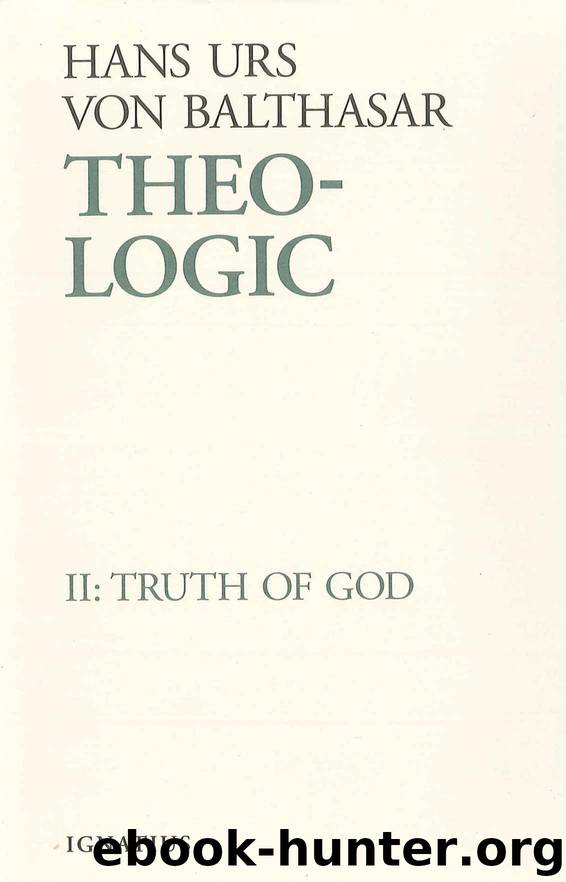Theo-Logic, Vol. 2: Truth of God by Hans Urs von Balthasar

Author:Hans Urs von Balthasar [von Balthasar, Hans Urs]
Language: eng
Format: mobi, epub
Tags: Spiritual & Religion
ISBN: 9780898707199
Publisher: Ignatius Press
Published: 2004-07-31T16:00:00+00:00
e. Expectant Vanity
Precisely at this point we must venture to turn our thoughts once more to Jesus the incarnate Word himself. This is difficult because we do not possess any ultimate insight into his consciousness and must adopt an attitude of reserve toward the Church’s redactions of his prophecies (Lk 9:22; 9:44; 18:31-33, par.). Jesus’ awareness that his efforts would be frustrated (cf. Mt 11:16f.) seems unquestionable; it cannot be skated over by the prospect of a happy end “on the third day”. A glance back at the Old Testament is not out of place here. Do not Sirach’s words, which echo so many complaints in the Psalms, Job, and Qoheleth, imply a vanity that remains juxtaposed to, and unreconciled with, confidence and hope? The prospect of a personal resurrection at the end of time is, like the hope for a future Messiah of the people, whose appearance I, a mortal, shall never see, only one of the attempts to reconcile the irreconcilable.51 The individual’s consciousness of belonging to the people may draw the irreconcilable closer together for him. For Jesus, however, anything of the kind is altogether out of the question.
Right from the beginning, Jesus must have had a clear view of the impossibility of accomplishing his earthly mission—of being the gathering of the scattered sheep of Israel, the reestablishment of the nation of the twelve tribes, indeed, the chosen emissary who would bring the “light of the nations to the ends of the earth” (Is 49:6; Lk 2:32). As resistance to him grew, clarity on this point could only have increased. Jesus must therefore have been aware of the prospect of the “hour”—which would have been constantly taking clearer and clearer shape before his mind—when the Father, acting through the emissary he has sent, would bring the latter’s mission to an end in a completely different way.
Jesus resolutely advances toward the final event, as all the Evangelists attest (Mk 10:32ff. par.). His way is one on which the disciples follow him “with fear and trembling”. It brings him toward the “baptism” that he “must receive” and before which he is “full of anxiety” (Lk 12:50). It is a way that, for him, leads at one and the same time to the ultimate frustration, since he dies rejected by Israel to the accompaniment of its scornful laughter, and to an “accomplishment” (Jn 19:30) that involves not only what he can do but also what the Father, into whose hands he commits himself, takes over and completes—even while having abandoned Jesus.
There seem to be three different, inextricably interwoven aspects of this event. First, Jesus’ consciousness that, if he has come to this end, it is because he has obediently followed the path traced out for him beforehand by the Father. The Gospels show Jesus frequently at prayer. This prayer undoubtedly concerned, inter alia, the alignment of his obedience in every new circumstance. And, as Jesus knew, he was “always heard” (Jn 11:41). In the same way, he also knows that
Download
Theo-Logic, Vol. 2: Truth of God by Hans Urs von Balthasar.epub
This site does not store any files on its server. We only index and link to content provided by other sites. Please contact the content providers to delete copyright contents if any and email us, we'll remove relevant links or contents immediately.
The Lost Art of Listening by Michael P. Nichols(7483)
Why I Am Not A Calvinist by Dr. Peter S. Ruckman(4135)
The Rosicrucians by Christopher McIntosh(3504)
Wicca: a guide for the solitary practitioner by Scott Cunningham(3158)
Signature in the Cell: DNA and the Evidence for Intelligent Design by Stephen C. Meyer(3120)
Real Sex by Lauren F. Winner(3000)
The Holy Spirit by Billy Graham(2934)
To Light a Sacred Flame by Silver RavenWolf(2802)
The End of Faith by Sam Harris(2724)
The Gnostic Gospels by Pagels Elaine(2515)
Waking Up by Sam Harris(2448)
Nine Parts of Desire by Geraldine Brooks(2355)
Jesus by Paul Johnson(2347)
Devil, The by Almond Philip C(2322)
The God delusion by Richard Dawkins(2295)
Heavens on Earth by Michael Shermer(2268)
Kundalini by Gopi Krishna(2171)
Chosen by God by R. C. Sproul(2151)
The Nature of Consciousness by Rupert Spira(2085)
